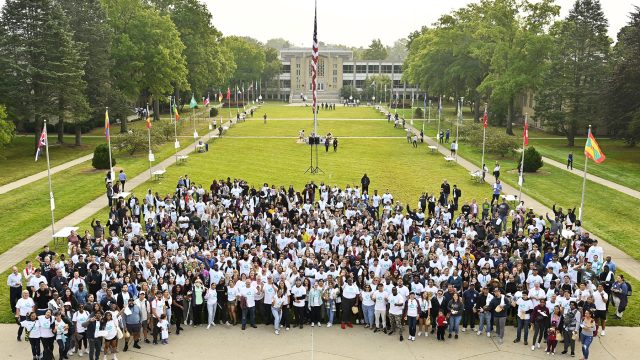How does a house help to explain our nature?

The other day I came across an old psychology textbook that depicted human personality as a small, one-level house with a basement. Its inhabitant lives on the main floor, which is clean and tidy and visible to everyone. This is the outward behavior and the life that people around us see. The roof contains social, religious, cultural, and ideological rules and guidelines—the goals and ideals that we use to govern our lives. The basement hosts the instinctual impulses, the most primitive part of people’s personality—inclinations that invite thoughts such as hatred and behaviors such as aggression.
This picture explains human behavior from a secular perspective, but it can also fit into the framework of a believer. Using biblical terminology, we would say that the roof equates to our conscience, as it tells us whether our choices are moral, legal, and coherent with our principles. The basement would clearly represent our sinful nature—those wild drives that Paul refers to as the “sin that dwells in me” (Rom. 7:17).* Last, the main floor would encompass our actual choices that trigger our behavior.
Behaviors and Attitudes
Through his exhortations and personal experiences, the apostle Paul provides an expert’s analysis of these forces living inside us that pull in various directions. He uses terms such as the “carnal” or the “flesh” versus the “spiritual” (see 1 Cor. 3:1-3; Rom. 7:5; 8:6). What can we learn from Paul’s writings to successfully manage these forces? How can we find and implement solutions to our daily struggles with sin? What is the best path to remedy the disastrous damage that wrong choices can bring to oneself and to others? Let’s take one example to answer these questions: the Colossian community.
Paul finds corruption and division at Colossae and offers solutions. The letter to the Colossian church tackled a problem of false beliefs. These included the wrong influence of “philosophy and empty deceit” (Col. 2:8), Jewish ceremonialism (verses 11-17), worshiping angels (verses 18, 23), the pretense of humility (verses 18, 23), and punishing one’s own body (verse 23). These false beliefs seem to have led to division and strife. Chapter 2 outlines the issues, and chapter 3 exhibits the consequences and the solution.
Paul makes sure he warns the Colossians about the falseness of these beliefs. He applies special emphasis, however, in promoting mutual peace and unity, which is the core of chapter 3. Yes, believing the right thing is very important, but in this particular case, the apostle is especially concerned about relationships. He identifies the undesirable behavior found in the congregation, most likely because of differences of beliefs and opinions, and what they need to do to overcome their predicament.
What were the behaviors and attitudes identified by Paul? In the first list he includes “fornication, uncleanness, passion, evil desire, and covetousness, which is idolatry” (Col. 3:5). In the second, anger, wrath, malice, blasphemy, filthy language, and lies (see verses 8, 9). Then he suggests behaviors and attitudes that will promote harmony. His advice applies to the church, which is what we address here. He also admonishes families, including husbands (and fathers), wives, children, and slaves, which is out of the scope of this article.
Looking Carefully
Returning to the analogy of the small house, if we go down into the basement of our “self” we find the evil that is within. Paul’s lists in Colossians 3 offer examples of immoral acts. The first highlights immorality, and the second focuses on aggression, particularly verbal aggression. The apostle Paul in another letter to another church asked the key question: “Who will deliver me from this body of death?” (Rom. 7:24). In the case of the church in Colossae, Paul specifically wrote providing advice to help church members overcome these barriers to harmony and to the fulfilment of the church’s mission.
Except for the gap of time and place, the issues in the church in Colossae and what society is facing today are remarkably similar. People do not think alike and are attacking each other. That reveals the necessity of a change, and Paul’s admonitions are as valid today as they were in the first century.
No one inside or outside of the United States could have foreseen what happened at the U.S. Capitol on January 6, 2021. The violence around that event and other hostilities related to the disastrous consequences of the COVID-19 pandemic throughout the past year show us the depravity of human nature. People exhibited verbal and physical behaviors that included anger, wrath, malice, blasphemy, filthy language, and lies, just as in the second list of Colossians (see Col. 3:8, 9). During these unprecedented times, many people, including Christians, have adopted opposing views and expressed them with utmost incivility, sometimes resulting in violence.
All of the above fits well in the list of defects outlined by Paul to the Colossians, particularly in his second list. And the sad truth is that in extreme social, political, or military conflict, when conditions are favorable, these basic, primitive, sinful traits emerge freely in the form of violence and attacks (against individuals and by individuals), homicides, looting, rapes, and generalized abuses of all sorts, as world history tells us. What has happened in the world in the last year should remind us that these hidden, dangerous instincts, the sinful nature as we Christians call it, are ever present, awaiting in our basements. If these drives are so powerful and pervasive, is there anything we can do to master them?
How Then Shall We Live?
Paul’s recommendations are included in Colossians 3:8-15, paraphrased below. First, reject anger, rage, malice, slander, filthy language, and lies, yes, even when interacting with the bigoted, the ignorant, and the liberal; yes, even behind the comfortable social-network platform that allows hurtful language without having to look at the opponent in the eye. Second, do not distinguish in your treatment of others between Gentile or Jew, circumcised or uncircumcised, barbarian, Scythian, slave or free—you fill in the blank with your relevant minority or majority.
Third, practice tender mercies, kindness, humility, meekness, longsuffering, and forgiveness, all bonded to perfection with love. What a refreshing set of virtues for us all facing these times of hostility! Finally, and as a result of the above, “Let the peace of God rule in your hearts, to which also you were called in one body; and be thankful” (Col. 3:15).
Paul offers the perfect formula. Will I listen? Will I follow it? Wise people in our midst are calling us to civility. This is a good step to connect with people who do not think alike. But Scripture is not telling us just to be civil, polite, and courteous, or to behave merely according to social conventions of propriety. This is a call beyond civility. My church pastor, Will Johns, encourages us to move from civility to active love. Colossians 3 speaks of throwing out the “old man” (or old self) and adopting the “new man” (or new self), which is being renewed in knowledge in the image of its Creator (see verses 9, 10).
It is only through Jesus that I can reconcile with my brother, sister, neighbor, or ideological opponent. When I look at Jesus, “with unveiled face, beholding as in a mirror the glory of the Lord, [I can be] transformed into the same image” (2 Cor. 3:18). Only then will I practice compassion, kindness, humility, gentleness, and patience. I will forgive grievances, and I will love my neighbor as myself.
* All Scripture quotations have been taken from New King James Version. Copyright © 1979, 1980, 1982 by Thomas Nelson, Inc. Used by permission. All rights reserved.








